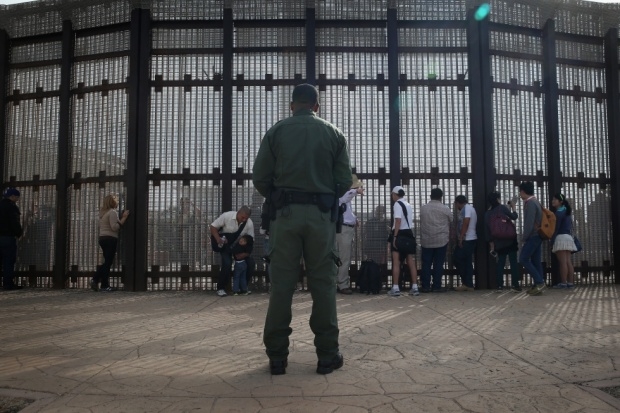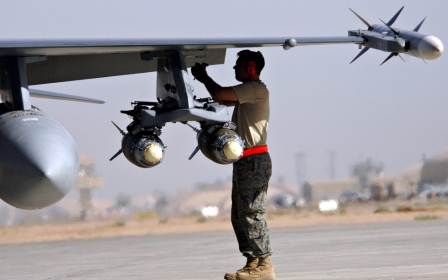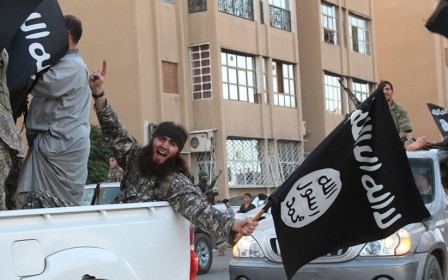Islamic State in the US

No sooner had the Islamic State (IS, formerly ISIS) become the latest global obsession than it turned up - where else? - in the United States.
A particularly brutal jihadist organisation and the keepers of a new caliphate in the Middle East, IS apparently already maintains sleeper cells in the US. At least, this is what former CIA operative Bob Baer says current intelligence-gatherers have told him.
Now a national security analyst for CNN, Baer remarked in a recent interview: “The people who do this for a living are very alarmed.”
The threat is thus far a bit nebulous, and Baer explains that IS designs for the homeland are unknown. But intelligence professionals “think [the jihadists have] come across the Mexican border in some cases. Some are American citizens that have come back from [fighting in] Syria.”
While making notes for this article a few days ago, I wrote: “Wouldn’t be surprised if we soon learn that IS is in cahoots with Mexican drug cartels.” Sure enough, Fox News produced the following headline on 8 September: “Security Expert: ISIS Could Pay Drug Cartel to Attack U.S. Power Grid.”
According to right-wing purveyors of fear, Mexican drug cartels have already collaborated extensively with members of Lebanon’s Hezbollah, who have taught them how to dig good tunnels and make good bombs.
Both groups have also been variously linked to al-Qaeda, the Revolutionary Armed Forces of Colombia (FARC), the late Hugo Chávez, the Iranian Revolutionary Guard Corps, and [insert anyone else we don’t like] as part of one big scary glob of “anti-Americanness” festering along the southern frontier.
Now IS has joined the club, and Peter Pry - executive director of the privately-funded Task Force on National and Homeland Security - has divined that the US power grid lies in the crosshairs of the jihadi-cartel axis.
A summary of Pry’s interview with Fox News is provided on the channel’s official blog, and concludes with the damning evidence: “Meantime, reports in June indicated that the entire country of Yemen lost electricity due to an attack on key power lines.”
Forecast of repression
But why stop at the power grid? It seems the joint efforts of drug lords and holy warriors could stand to be a bit more sensational. Why don’t they build an asteroid, or a cocaine-powered robot that beheads people?
This is not to imply, of course, that there is no threat posed to US territory by IS; there is.
The reason for this is simple: when you make a habit of messing militarily with people abroad, sometimes they turn around and mess with you right back. One problem with hysterics over IS in the US, however, is that they justify further international messing by the imperial war machine, the repercussions of which should be obvious to anyone with a rudimentary grasp of cause and effect relationships.
The hype also serves a number of domestic functions. For one thing, as we know from the War on Terror, the terrorist-fighting procedure requires a wanton violation of civil liberties on the part of the state, mass surveillance operations, racial profiling, and an official reliance on entrapment methods to deliver a quota of “terrorists”. These should also usually be of a certain ethno-religious background to show the public that all of these abuses and more are in fact necessary for national security.
What we can expect from IS’s US debut is not only a reinvigorated trampling of rights, but also a boost in anti-immigrant rhetoric, and not only against Arabs and Muslims.
The already maligned Latin American immigrant community - whose helpful services to US society have been rewarded with an inhumane deportation frenzy - will be disproportionately targeted by law enforcement and made to pay the consequences of originating from the same side of the US-Mexico border from which the IS cells allegedly infiltrated.
Todd Miller, author of the recent book Border Patrol Nation: Dispatches from the Front Lines of Homeland Security, documents how, under the pretext of fighting terrorism in the aftermath of 9/11, the jurisdiction and powers of the US Border Patrol have been expanded to the point of extreme tragicomedy.
The Super Bowl, for example, apparently now qualifies as an international border. In lieu of terrorists, it is generally harmless undocumented workers who have borne the brunt of this expansion and the attendant reinforcement of racial profiling traditions.
Border Patrol’s repertoire also includes cross-border fatal shootings of Mexican citizens such as 16-year old Jose Antonio Elena Rodriguez, reportedly shot eight times in the back in 2012. It goes without saying that Border Patrol will also play a starring role in the latest iteration of perpetual war.
Industrial growth
In response to the IS threat abroad, US air power has once again been unleashed on the nation of Iraq, while Barack Obama continues to cultivate his fantasy of arming a “moderate” opposition to Syrian President Bashar al-Assad.
As I noted in my review for Middle East Eye of Patrick Cockburn’s new book The Jihadis Return: ISIS and the New Sunni Uprising, Cockburn has detailed how such efforts help ensure that our weapons keep ending up in the hands of our enemies:
“It is here that self-deception reigns, because the Syrian military opposition is dominated by ISIS and by [official al-Qaeda representative] Jabhat al-Nusra… in addition to other extreme jihadi groups. In reality, there is no dividing wall between them and America’s supposedly moderate opposition allies.”
But, hey, at least it’s a good way to perpetuate conflict.
Beyond the arms industry, this is also a golden age for self-styled terrorism experts and analysts, whose job it is to remove acts of terrorism by Muslims from the general context of imperial terror and to prolong the profitability of their “expertise” by sowing popular fear and panic.
In a 2009 CounterPunch essay based on a series of interviews with ex-CIA operative Baer, Christopher Ketcham reported that the “intelligence-industrial complex,” encompassing “private sector contracts outsourced to ex-CIA officers who offer their services to the agency at thrice what the average CIA staffer makes,” was then worth up to $50 bn a year.
“All this effort is meant to defeat the noun called ‘terror’ and find [Osama] Bin Laden, who has taken up the useful spot on the horizon where Communism once loomed as the threat,” wrote Ketcham.
“Bob Baer profited from the Bin Laden threat industry with his first book [See No Evil : The True Story of a Ground Soldier in the CIA’s War on Terrorism, which inspired the Hollywood film Syriana]."
Ketcham quotes Baer himself: “There’s money, careers, whole reputations dependent on the Bin Laden threat. But the threat has come and gone. We f**ked that one up.’”
Luckily for a lot of folks, f**kups are our specialty.
Belen Fernandez is the author of The Imperial Messenger: Thomas Friedman at Work, published by Verso. She is a contributing editor at Jacobin
Magazine.
The views expressed in this article belong to the author and do not necessarily reflect the editorial policy of Middle East Eye.
Photo credit: The border wall separating US territory from Mexico (AFP)
Middle East Eye propose une couverture et une analyse indépendantes et incomparables du Moyen-Orient, de l’Afrique du Nord et d’autres régions du monde. Pour en savoir plus sur la reprise de ce contenu et les frais qui s’appliquent, veuillez remplir ce formulaire [en anglais]. Pour en savoir plus sur MEE, cliquez ici [en anglais].





